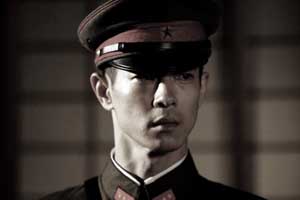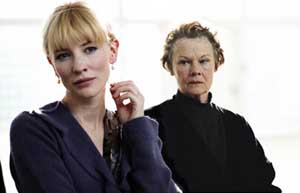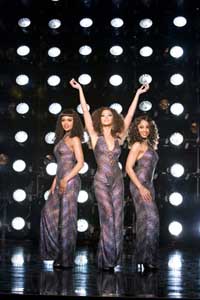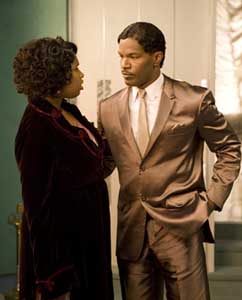-
- Schwarzenegger starts new term declaring himself a centrist
- Advocates push for vote on Mass. health care amendment
- Duke University researchers hail new HIV/AIDS test
- Ky. state rep won’t revisit same-sex marriage ban
- Gadfly priest challenges mandatory celibacy in new book
- McCain, seen as Republican front-runner, a target for all sides
- Mass. group opposed to same-sex marriage withdraws $5 million lawsuit
- National News Briefs
- World News Briefs
Arts & Entertainment
Out at the movies
Published Thursday, 11-Jan-2007 in issue 994
Letters from Iwo Jima
Directed by Clint Eastwood
Written by Iris Yamashita
Starring: Ken Watanabe, Kazunari Ninomiya, Tsuyoshi Ihara and Ryo Kase
142 minutes in CinemaScope
At a point where most legendary filmmakers feel content to fall back on their laurels (see Billy Wilder’s Buddy, Buddy), Clint Eastwood took on the greatest challenge of his career: a two-part, 274-minute epic that focuses on both sides of the battle of Iwo Jima.
The problems I had with Flags of Our Fathers can be traced back to two of my favorite whipping boys: Spielberg produced and Paul Haggis co-wrote. The latter’s influence was strongly felt as much of it played out in a predictable Saving Private Ryan fashion.
As for Haggis, the wraparound material he wrote depicting the survivors 60 years later was dreadful. The same can be said of the repetitive Ira Hayes “drunken Injun’” subplot. He was nowhere in sight for Letters from Iwo Jima. Iris Yamashita adapted the script from her story, and Stevie has enough trouble understanding English – let alone Japanese – and appears to have laid low.
They have been called Ben Shockley, John Wilson, Bill Munny, Bronco Billy and Harry Callahan. Sometimes they come nameless, but the one thing all Clint Eastwood characters have in common is a dedication to getting the job done. Fathers lacked this type of a strong central character to connect with. Iwo Jima’s Gen. Kuribayashi (Ken Watanabe) is as instantly recognizable a Clint Eastwood character as any of the abovementioned.
I noticed signs of gradual darkening in the films of Clint Eastwood as far back as The Gauntlet, but nobody would listen. Who could have anticipated that his career would have taken such a pitch black turn? Never a stranger to violence, if anything he was one of the few who knew how to use it in order to underscore his basically humanist pleas.
From Mystic River on, Eastwood’s films have become progressively bleaker. Both River and Million Dollar Baby are heart wrenching. Iwo Jima features a scene of such brutal violence, soldiers committing suicide by holding active grenades, that it forced me to look the other way.
It took forever for “serious” critics to come around to Clint. Those fortunate enough to have experienced and understood his career first hand, as it stretched from Italy to Malpaso, have witnessed the evolution of cinema’s preeminent actor/director. I used to rank Clint No. 2 behind Scorsese as America’s finest working director. Given both filmmakers’ recent output, I might be inclined to give Clint the edge.
Rating: ****
Notes on a Scandal
Directed by Richard Eyre
Written by Patrick Marber
Starring: Judi Dench, Cate Blanchett, Bill Nighy and Andrew Simpson
Though it would have been a perfect part for her, Joan Crawford could not have played the Barbara Covett role in Notes on a Scandal.
Ms. Crawford was a glamorous movie star, dammit, and in her heyday would never have allowed herself to be photographed in such a flaw-finding manner. Even in the dank, dark hold of Strange Cargo’s prison ship, what little light cinematographer Robert Planck allocates finds her face.
Judi Dench certainly qualifies as a movie star and, unlike Joan Crawford, an actress as well, and her performance here is both fault and vanity free. My mother’s generation would get a wash and set every week, and water would not touch their hair between beauty parlor visits. Ms. Dench spends much of the movie coiffed as though it’s the morning of her next appointment.
The reason for all this talk of Ms. Crawford is because throughout NOS, I found myself constantly reminded of Whatever Happened to Baby Jane?, the only one of Crawford’s films in which she put away the glamour. Shift the setting from a rundown Hollywood mansion to an unruly British high school, recast Cate Blanchett in the sympathetic Crawford role and Dench as the domineering Bette Davis and you have an equally worthy battle of the superstar actresses.
Adapting Zoë Heller’s novel, screenwriter Patrick Marber’s (Closer) mordant voice-over narration gives us an all-access pass into the thought patterns of a bitter spinster with a titanic superiority complex. As Barbara Covett, Dench finds a level of pure evil that would make Freddie Krueger blanch.
If given the choice between being loved or feared, Barbara would quickly pounce on the latter. Her students live in mortal terror. They may stir when the final bell sounds, but they don’t dare exit class until a nod replaces Barbara’s scowl.
Enter new hire Sheba Hart (Cate Blanchett), an ex-party girl who settled comfortably into the position of pottery teacher. When asked to dinner, Barbara is shocked to find she has a husband (the brilliant Bill Nighy) 20 years her senior, a teenage daughter and a son with Down syndrome whom the voice-over describes as a “somewhat tired court jester.”
Barbara is immediately smitten by Sheba, but it’s not the type of lusty infatuation that has caused some to erroneously dub this a “lesbian Fatal Attraction.” Barbara is not in this for the sex; she seeks a companion to grow old and sip tea by the fire with. Nor is director Richard Eyre interested in churning out another stock Hollywood thrill ride.
Barbara doesn’t miss a beat. The slightest lunchroom scuffle is noted, and settled, as she briskly passes by it. She needs more leverage to pry Sheba from her family. As luck would have it, Barbara happens upon her prey and a student (Andrew Simpson) going at it on school property. I took great delight in watching just how far Barbara went to milk this bit of knowledge in her quest to make Sheba hers. This is the kind of first-rate, engaging escapist entertainment that’s long been lacking in contemporary genre films.
What’s truly amazing about Notes on a Scandal is its ability to infuse the lead character with such honest psychological insight and personal awareness. There is not a moment in this film where Barbara does not convincingly sell us on her motivation and reasoning. It is so nice to once again have a thinking person’s psycho to cheer for.
Rating: ****
Dreamgirls
Written and directed by Bill Condon
Starring: Beyoncé Knowles, Jennifer Hudson, Eddie Murphy and Jamie Foxx
131 minutes in CinemaScope
The two worst things to happen to popular music in the past 30 years were Andrew Lloyd Weber’s dull talk-singing and the tonsil-stretching caterwauls emanating from “American Idol.”
Dreamgirls is an impious merger of the two, born in hell and condemned for eternity to home video.
Speaking of eternity, what should have been forever took only 25 years to make it to the screen. This Supreme(s) Broadway smash was originally designed with Nell Carter in mind, but the part eventually went to Jennifer Holliday. In the late ’80s, talk was underway about a film version to showcase egomaniacal songbird Whitney Houston. According to Wikipedia.com, “The production ran into problems when Houston wanted to sing both Deena and Effie’s songs (particularly ‘And I Am Telling You I’m Not Going’).”
In 1994, DreamWorks planned an adaptation starring Fugees lead singer Lauryn Hill. After Why Do Fools Fall in Love tanked at the box office, the studio gave up hope on producing another ’60s music biopic.
Bill Condon, the man guilty of writing the heinous Chicago, sold the producers on his vision to can the musical for the ages. In Gods and Monsters, writer/director Condon told us nothing more than the man behind Universal’s first two Frankenstein pictures was gay. In Dreamgirls, Condon tells us nothing. His attempts to “open up” the play by inserting the King assassination and the civil rights movement are out of place to the point of being downright contemptible.
Good chunks of this are nonsensical. After the promising singing trio agrees to sing backup for James “Thunder” Early (Eddie Murphy), Lorrell (Anika Noni Rose) makes her way to the back of the tour bus bent on seducing the R&B legend. Just as she’s about to seal the deal, Lorrell mentions Early’s wife, turns and storms back in the direction of the driver. The point being…
Jamie Foxx is terrible. How did this preening somnambulator ever win an Oscar? Eddie Murphy might have been funny had I never seen his James Brown shtick on “SNL.” As an actress, Beyoncé did a convincing job of losing weight for the role.
OK, I’ll admit it: Jennifer Hudson is magnificent and even though I cannot recall one fetid lyric, her force and screen presence burn brightly. But she’s not enough. Once again, I strongly urge that you wait for this to come out on DVD and not rent it.
Rating: 0
|
|
Copyright © 2003-2025 Uptown Publications





